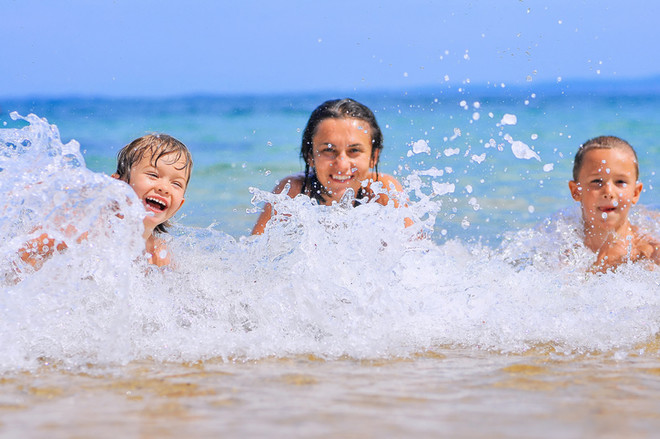Ahead and a half months of the summer, and we are sincerelywe believe: the swimming season will still be open. And not in a puddle, but in the most real sea (lake / stream / river - choose the right one). But during the rainy season, the rules of behavior on the water and forget it for long. And someone, maybe, does not even know them. Or he thinks he knows, but he really is mistaken. Can you say how many minutes the children should spend in the water? And how much time should pass between the swim and the food? The Soviets shared the experts of the transport police. "The rules of behavior on the water for children are practically the same as those for adults," the ministry said. - Adults should always remember that they are an example for their children. No matter how much you tell the child about how to behave on the water, if you do not observe these rules yourself, all is ineffectual. Photo: Getty Images1.Children should only swim under parental supervision. 2. Swimming is allowed only on equipped beaches where lifeguards are on duty. 3. Under no circumstances should you swim in places near which there are signs saying “Swimming is strictly prohibited!” 4. Children should not play or be near a body of water unless their parents are nearby. 5. Children should not swim if they have a fever or are unwell. 6. Babies should not stay in the water for more than 30 minutes, and if the water is cool – 5-7 minutes. 7. You should not swim immediately after a large meal. You must wait 30-45 minutes. 8. Even if your baby can swim well, he should not swim in deep places. 9. You should not swim beyond the buoys, even in the presence of parents. 10. You should not dive in unfamiliar places. 11. You should not jump into the water from heights not suitable for this. 12. It is strictly forbidden to play games in the water during which you need to drown others. 13. You must not dive spontaneously or grab someone by the legs in the water - a frightened person can accidentally injure the diving joker. 14. On hot sunny days, you must swim in hats. 15. You must not swim in a storm or with large waves. 16. You must not swim on damaged watercraft (mattresses, rings, etc.). 17. You must not swim on watercraft beyond the buoys. 18. You must not swim on watercraft in strong waves or during a storm. 19. After swimming, you must dry yourself well with a towel and blot your ears. 20. If the child still chokes on water, first of all, give him a chance to cough well: take him out of the water, wrap him in a towel, calm him down and give him some warm tea to drink. It is also useful to know:
Photo: Getty Images1.Children should only swim under parental supervision. 2. Swimming is allowed only on equipped beaches where lifeguards are on duty. 3. Under no circumstances should you swim in places near which there are signs saying “Swimming is strictly prohibited!” 4. Children should not play or be near a body of water unless their parents are nearby. 5. Children should not swim if they have a fever or are unwell. 6. Babies should not stay in the water for more than 30 minutes, and if the water is cool – 5-7 minutes. 7. You should not swim immediately after a large meal. You must wait 30-45 minutes. 8. Even if your baby can swim well, he should not swim in deep places. 9. You should not swim beyond the buoys, even in the presence of parents. 10. You should not dive in unfamiliar places. 11. You should not jump into the water from heights not suitable for this. 12. It is strictly forbidden to play games in the water during which you need to drown others. 13. You must not dive spontaneously or grab someone by the legs in the water - a frightened person can accidentally injure the diving joker. 14. On hot sunny days, you must swim in hats. 15. You must not swim in a storm or with large waves. 16. You must not swim on damaged watercraft (mattresses, rings, etc.). 17. You must not swim on watercraft beyond the buoys. 18. You must not swim on watercraft in strong waves or during a storm. 19. After swimming, you must dry yourself well with a towel and blot your ears. 20. If the child still chokes on water, first of all, give him a chance to cough well: take him out of the water, wrap him in a towel, calm him down and give him some warm tea to drink. It is also useful to know:

Making Money with Desserts: Success Stories
Evgeniya Polischuk (Fedutinova) instagram:@evgeniyafedutinovavk.com/janeshomebaking– It all started with baking for family and friends. Gradually, I started posting photos of my baked goods on Instagram – and orders started coming in. I made my first custom-made cake on October 13, 2014, and a little earlier I started making macaroons and cupcakes. You could say that the business “found me”, I am very […]

Soups are cold recipes with photos
Cold cucumber soup with yogurt and lemonsorbet from the chef of the restaurant La Taverna Alexander Zhurkin Photo: Getty Images Ingredients: Plain yoghurt – 125 g Cucumber – 150 g Lemon/lime sorbet – 50 g Cocktail shrimp – 24 g Fresh ginger juice – 1 g Lime juice – 5 g Fresh orange juice – 5 g Parsley – 1 g Pink pepper – 1 g Watercress – […]

barbeque kebab
Pork tenderloin in glaze Photo:Dmitry Bayrak/dbstudioPreparation time: 20 minutes + marinating time.Calories: 454 kcal per serving.For 4 servings: 4 pork tenderloins (approximately 300 g each), 1 onion, 2 cloves of garlic, 1 tsp. lemon zest, 1 tsp. lemon juice, a pinch of ground cumin, coriander and turmeric, 1 tbsp. vegetable […]

Pierre Duacan: dietary recipes: Ducane diet
Beetroot soup Photo:Season’S, Luxury Hotels RepresentationYou will need:· Boiled beetroot – 60 g· Fresh cucumbers – 20 g· Red radish – 20 g· Green onions – 10 g· Egg – 1 pc.· Drinking mineral water – 200 g· Salt – 1 gPreparation:· Boil the egg and beetroot.· Grate the cucumbers, radish and part of the beetroot. Put everything […]





